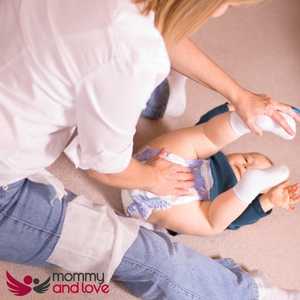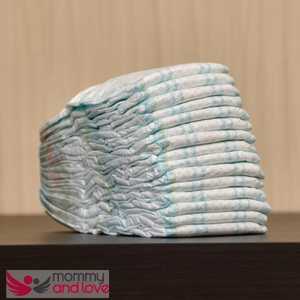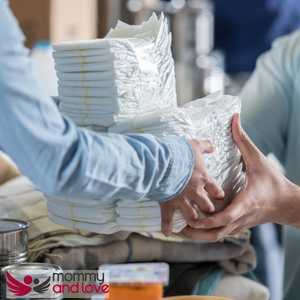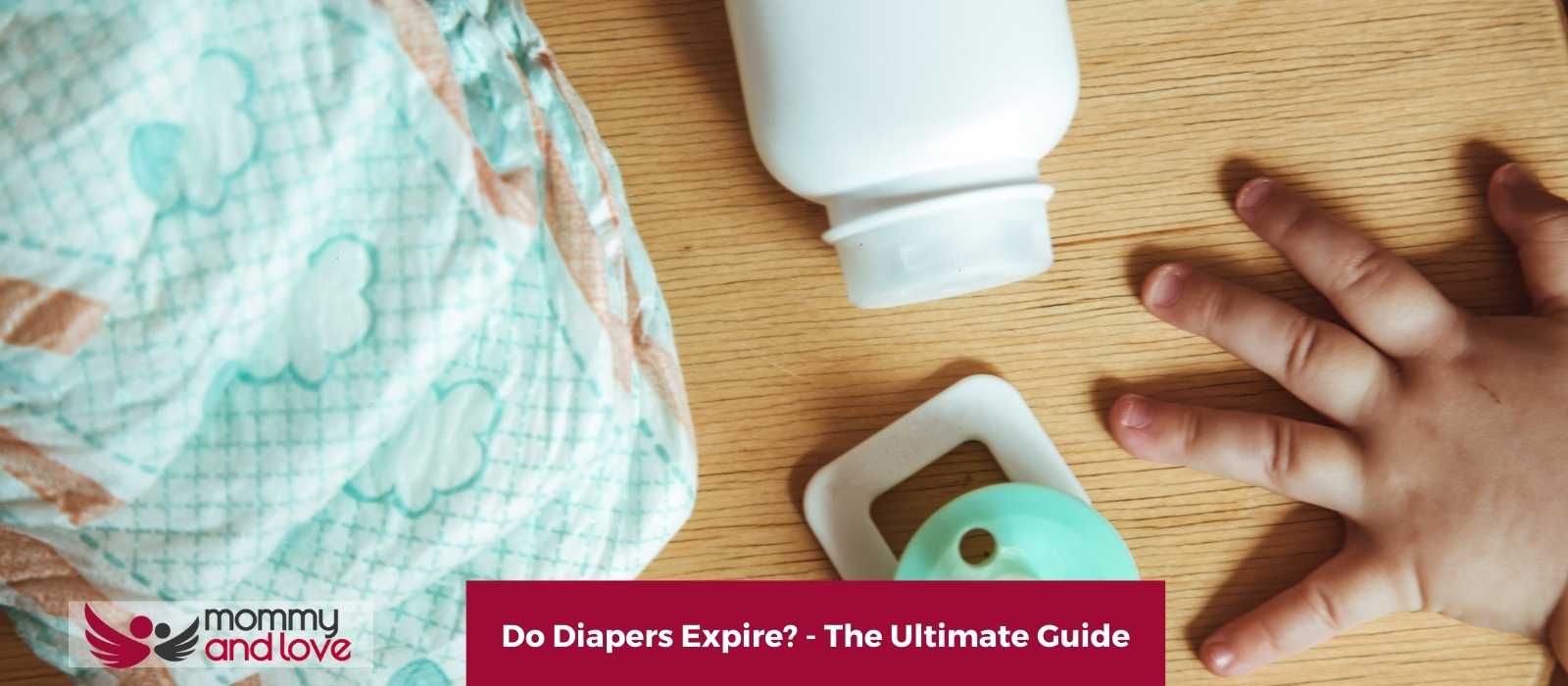No one wants to have a baby and then deal with the stress of trying to figure out if the diapers they have are still good. In this blog post, we will discuss if do diapers expire, so you can rest assured that your little one is always clean and dry!
How Long Do Disposable Diapers Last?

So, do diapers expire? It really depends on the diaper and how often it’s used.
A single disposable diaper can last anywhere from a few hours to a full day.
However, if you’re using them frequently, they may only last for a couple of hours before needing to be changed.
Disposable diapers and baby wipes are designed to be absorbent and comfortable, but they’re not meant to be used for extended periods of time. If you need to use disposable diapers for more than a few hours, it’s best to change them as soon as possible to avoid any discomfort or leaks.
In general, though, you can expect a disposable diaper to last anywhere from a few months to years. With proper care and storage, they can even last longer! Just be sure to check the diaper for any leaks or damage before using it.
Do Diapers Expire or Have A Shelf Life?
Many parents might have asked – do Pampers diapers expire? No, baby diapers do not have an expiration date or shelf life at least the popular diaper manufacturers such as Pampers diapers and Luvs diapers. However, they may not have an expiration date but their super absorbent polymer will lose effectiveness for absorbing liquids over time as the diaper ages. For this reason, it is important to check the absorbency of your diapers regularly and change them when necessary. If you are using cloth diapers, you may also need to increase the number of changes per day as they become less absorbent.
While most nappies don’t have expiration dates, it is important to check unopened diapers and the diaper packaging after years of purchase before using them. Most diaper manufacturers recommend that you use their product within one to two years. If the diaper has an expiry date, it means that the diapers work up until that date.
Interestingly, baby wipes expire.
How to Store Disposable Diapers Properly

If you have a new baby, chances are you have a pack of diapers.
And if you have diapers, you need to know how to store them properly.
Here are some tips on how to store diapers so they stay fresh and don’t get damaged:
- Store more diapers in a cool, dry place. Diapers should be stored in a cool, dry place away from direct sunlight. A basement or closet is a good option. Extreme heat can affect your diapers.
- Keep them in a diaper pail. A diaper pail is a great way to keep other diapers stored properly and prevent them from gathering unpleasant odor. This will help keep them out of reach of children and pets, and it will also help keep the area around the diaper pail clean.
- If you don’t have a vacuum sealer, use a container with an airtight seal for long-term storage instead. This will keep your diapers fresh and prevent them from getting musty which is harmful to your baby’s skin. Don’t store them in a cardboard box.
- Save diapers from molds and add a desiccant: This will help absorb moisture and keep your diapers dry.
- Use a dark-colored container: This will prevent sunlight from bleaching your baby’s diaper.
Is It Safe to Use Old Diapers?
So we’ve answered the question “do diapers expire?”. The next question would be “is it safe to use old unused diapers?” This is a question that we hear often, and the answer may surprise you. It is safe to use old diapers, as long as they are not soiled or wet. If they are soiled or wet, then you should dispose of them properly.
Don’t use an old diaper on your next baby if you think that it is no longer usable because it was stored improperly. It’s better to buy fresh, new diapers than using expired diapers, assuming the old diaper is already past its best by date (some nappies have an expiry date).
If you have old nappies that are in good condition, then you can donate them to a diaper bank or charity. Diaper banks provide free nappies to families in need, and they are always in need of donations. We’ve done a guide to where to donate nappies to here.
If you have any questions about whether it is safe to use old diapers, then you should contact your local health department or the EPA. They will be able to give you the most accurate information.
What to Look Out for in Older Diapers?
If you’re using cloth diapers, it’s important to inspect them regularly for wear and tear. Here are some things to look out for in older diapers:
- Stains – Older diapers may have more stains than newer ones. Inspect the fabric for any discoloration or staining. Don’t use stained diapers because they can irritate your baby’s delicate skin.
- Molds – Check all layers of the nappy such as an outer layer, absorbent top sheet, absorbent layer and absorbent core. The outer layer is most likely made from plastic fiber and waterproof material while the inner layers might be made from wood pulp and other paper products. These materials tend to produce unpleasant odors when moldy.
- Holes – Small holes or tears in the fabric can cause leaks. Inspect the diaper for any holes, and if you find any, patch them up with a piece of matching fabric.
- Stretch panels and innermost layer – The elastic and padding in older diapers may be less dense than it was when the diaper was new. This can cause leaks. To test the padding and elastic, press down on it with your finger. If it feels thin or flat, you may need to replace it.
- Depending on the type of fabric and storage conditions, the fabric may begin to discolor after a period of time. Nappies with waistbands may lose their elasticity and become brittle. As previously stated, those that use sticky tapes will not have the same stacking strength.
- Another consideration with older nappies is that the absorbing substance may degrade over time. As a result, they may lose their ability to absorb moisture, resulting in leaks.
- Older nappies may also have loosened elastic around the legs, which can lead to more leaks. Furthermore, the adhesive tape used to keep nappies in place can wear out after a few years. You don’t want a diaper that falls off owing to a lack of stickiness!
- Spandex, the material utilized for elasticity in the leg cuffs and waistband, is heat and moisture resistant. However, if rubber or latex is added to it, it may degrade with time. You may have to cope with a leaky diaper if there is no flexibility, particularly in the leg openings.
What to Do With Unused Diapers?

We all know that feeling of dread when we realize we have a whole stash of unused diapers.
Maybe you bought the wrong size, or your baby grew out of them before you could use them all.
Whatever the reason, you can do something with diapers left over from your previous child.
Here are a few ideas of what you can do with those extra diapers:
- Donate them to a local women’s shelter or diaper bank. There are many families in need who would be grateful for your donation.
- Sell them online. Sites like eBay and Craigslist are great places to sell unwanted items, including diapers.
- Give them to a friend or family member who has a baby.
- Use them for crafts or other projects. Diapers can be used to make everything from diaper cakes to stuffed animals.
Conclusion
So, do diapers expire? The answer to this is no. We hope that this article has answered all of your questions about diapers and their expiration date. However, some diapers expire so make sure to check the expiration date on the packaging. Remember, it is safe to use old diapers, as long as they are not soiled or wet. If you have any questions, be sure to contact your local health department or the EPA. And if you find yourself with a surplus of unused diapers, consider donating them to a local women’s shelter or diaper bank.

This article was written by: Gian MIller – Full-Time Writer, Baby Whisperer & Dad of 3.
Gian spends a lot of his time writing. A self-proclaimed baby whisperer, Gian has been through it all with his own children and is passionate about sharing his hard-won wisdom with other parents. When he’s not writing or changing diapers, you can find him playing the guitar or watching baseball (or preferably both at the same time).




